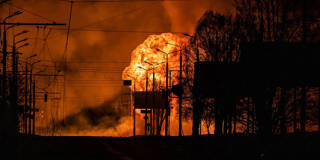Although Vladimir Putin's war in Ukraine has summoned memories of some of the darkest moments of the twentieth century, it would be a mistake to say that history is merely repeating itself. Rather, what we are witnessing is a convergence of previous events and incomplete legacies into a single explosive conflagration.
VITORIA-GASTEIZ – Philosophers are supposed to comprehend events and phenomena from a rather detached standpoint, keeping in mind useful theoretical models and precedents. But the situation in Ukraine has made detachment difficult for me. Not only does more than half my family come from Ukraine, but I have also long been preoccupied – philosophically and personally – with the issue of nuclear and radioactive threats, centering on the Chernobyl power plant and the use of nuclear weapons.
Nonetheless, today’s circumstances demand clear thinking. As I argued in my 2021 book Senses of Upheaval, in a chapter entitled “The Unfinished Collapse of the Soviet Union,” we need to develop “a robust philosophy of history” capable of accounting for historical “gaps, protracted subterranean processes, and time lags between causes and effects.”
The urgency of this task has now become painfully obvious. We are witnessing the outcome of the time lag between the official end of the USSR in 1991 and its unresolved legacies. Those legacies are responsible not only for the war in Ukraine, but also for the simmering conflict between Armenia and Azerbaijan in Nagorno-Karabakh, and for the tragic fate of Belarus. And constantly looming in the background is the Soviet nuclear arsenal, which Ukraine agreed to transfer to Russia soon after becoming an independent state.

VITORIA-GASTEIZ – Philosophers are supposed to comprehend events and phenomena from a rather detached standpoint, keeping in mind useful theoretical models and precedents. But the situation in Ukraine has made detachment difficult for me. Not only does more than half my family come from Ukraine, but I have also long been preoccupied – philosophically and personally – with the issue of nuclear and radioactive threats, centering on the Chernobyl power plant and the use of nuclear weapons.
Nonetheless, today’s circumstances demand clear thinking. As I argued in my 2021 book Senses of Upheaval, in a chapter entitled “The Unfinished Collapse of the Soviet Union,” we need to develop “a robust philosophy of history” capable of accounting for historical “gaps, protracted subterranean processes, and time lags between causes and effects.”
The urgency of this task has now become painfully obvious. We are witnessing the outcome of the time lag between the official end of the USSR in 1991 and its unresolved legacies. Those legacies are responsible not only for the war in Ukraine, but also for the simmering conflict between Armenia and Azerbaijan in Nagorno-Karabakh, and for the tragic fate of Belarus. And constantly looming in the background is the Soviet nuclear arsenal, which Ukraine agreed to transfer to Russia soon after becoming an independent state.